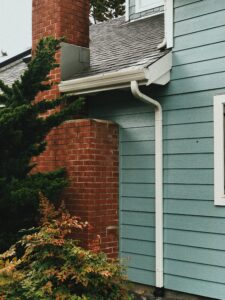Gutters are vital components that every house should have. Their primary role is to channel rainwater away from the roof and foundation of a building, thus preventing water damage. Without gutters, water would fall off the roof and collect around the foundation, causing soil erosion and structural damage over time.
Apart from protecting your home’s foundation, gutters also safeguard your landscape by directing rainwater away from plants and flowers. They also help prevent basement flooding by guiding excess water away from the house. In addition, gutters can prevent mold growth by keeping moisture levels in check.
Overall, it is essential to have properly installed and maintained gutters on your home. Neglecting this important aspect of home maintenance can lead to costly repairs down the road. So if you don’t have gutters already or need yours replaced, it’s worth investing in their installation sooner rather than later to protect your property for years to come.
Advantages of Gutters
Gutters are an essential component of any house. They provide a useful function in directing water away from the foundation, preventing water damage and erosion to the home’s exterior. Without gutters, water can pool around the foundation, resulting in moisture seeping into the basement or crawl space, causing mold growth and structural problems.
Another advantage of gutters is that they protect your landscaping by preventing soil erosion. A properly installed gutter system will direct rainwater away from delicate plants and flowers, preserving their health and beauty. Additionally, gutters also help prevent damage to driveways and walkways by redirecting water flow away from these areas.
Finally, investing in quality gutters can save you money in the long run by reducing costly repairs due to water damage. By keeping water flowing away from your house’s foundation and exterior surfaces, you’re avoiding major expenses such as replacing rotted wood or repairing cracked foundations caused by excessive moisture exposure.
Overall, it is clear that installing gutters has many advantages for homeowners seeking to protect their homes’ longevity and value while maintaining a beautiful landscape.
Disadvantages of Gutters
One of the most significant disadvantages of gutters is that they require regular maintenance. When gutters become clogged with debris such as leaves, twigs, and dirt, water can accumulate and overflow onto the roof, causing damage to shingles or tiles. Additionally, standing water in gutters can attract mosquitoes and other pests.
Another disadvantage of gutters is that they can be expensive to install. Depending on the size of your home and the type of gutter system you choose, installation costs can range from a few thousand dollars to tens of thousands. Even after installation, repairs may be necessary if gutters are damaged by severe weather or falling tree limbs.
In conclusion, while homeowners who live in areas with heavy rainfall should consider installing gutters to protect their homes’ foundations from erosion and flooding, there are several disadvantages to this type of system. Regular maintenance and repair costs can add up over time, making it important for homeowners to carefully consider whether or not gutters are necessary for their specific situation.
Different Types of Gutters
Gutters play a crucial role in protecting your home from water damage. Without gutters, rainwater can flow directly off the roof and onto the ground next to your house, causing erosion and potentially leading to foundation damage. There are several different types of gutters available on the market today, each with its own benefits and drawbacks.
One common type of gutter is the K-style gutter, which has a flat bottom and back with a decorative front that resembles crown molding. K-style gutters are popular because they can hold more water than half-round gutters of the same width. Half-round gutters are another option that some homeowners prefer for their more traditional aesthetic appeal.
Another type of gutter is seamless aluminum or steel gutters, which have fewer seams than sectional gutters and therefore require less maintenance over time. Copper gutters are also an option for those who want a durable material that develops a unique patina over time. Ultimately, it’s important to choose a type of gutter that will work best for your particular climate and weather conditions in order to protect your home from costly water damage in the long run.
DIY vs. Professional Installation
Gutters are an essential part of a home’s drainage system, preventing water damage to its foundation and landscape. When deciding to install gutters, homeowners must choose between DIY or professional installation. While installing gutters yourself may save money upfront, it can lead to costly mistakes and unsafe conditions.
DIY installation requires purchasing the necessary tools and materials, accurately measuring the roofline for proper gutter placement, and safely climbing a ladder to hang the gutters. Without experience in these areas, mistakes can easily be made during installation that could cause improper water flow or even damage to the house itself.
Professional installation eliminates many of these risks as experienced technicians handle all aspects of the job from start to finish. They have knowledge of proper gutter placement for optimal functionality and use specialized equipment ensuring safe work practices. While more expensive than DIY options initially, professional gutter installation can actually save money in the long run by preventing costly damages caused by improperly installed gutters.
In conclusion, while DIY projects may be enjoyable and cost-effective in some cases; installing gutters is not one of them. It’s always best to invest in quality workmanship when it comes down to protecting your property from unnecessary water damage that could cost you more than just time and money but also peace of mind!
Maintenance Requirements
Gutters are an essential part of any house’s maintenance requirements. Gutters are designed to collect and divert rainwater away from the foundation of your home, preventing water damage and erosion. Without gutters, rainwater can seep into the soil around your home’s foundation, causing structural damage over time.
While gutters may not seem like a crucial component of your home’s structure, they play a vital role in maintaining its overall health. Properly functioning gutters prevent water from pooling on your roof or around the perimeter of your house, which can cause leaks and other types of water damage. Additionally, clogged or damaged gutters can lead to mold growth or even pest infestations.
To ensure that your gutters are working correctly and protecting your home as they should be, it is important to have them inspected regularly by a professional. A qualified contractor can identify any issues with your gutter system and recommend repairs or replacements as needed. In short, investing in proper gutter installation and maintenance is a small cost compared to the significant expense that comes with repairing water-damaged foundations or roofs down the line.
Conclusion: Are Gutters Necessary?
In conclusion, gutters are essential for houses as they protect them from water damage. Without gutters, rainwater may cause soil erosion by washing away the ground’s top layer, making it difficult to maintain lawns and gardens. Furthermore, water could seep into the foundation of a house and cause cracks or leaks that can weaken its structure over time.
Additionally, the lack of gutters may also lead to basement flooding and mold growth due to excess moisture. Moreover, without proper drainage systems in place, rainwater can accumulate on roofs and potentially damage shingles or tiles.
Overall, investing in good quality gutters is crucial for any homeowner who wants to protect their property from potential water damage. By ensuring that your home has an adequate gutter system installed properly and regularly maintained will save you significant repair costs in the long run.


